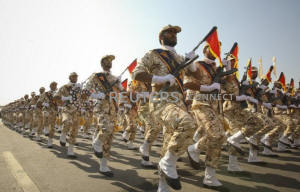|
U.S. to designate elite Iranian force as
terrorist organization
 Send a link to a friend
Send a link to a friend
 [April 06, 2019]
By Phil Stewart, Lesley Wroughton and Steve Holland [April 06, 2019]
By Phil Stewart, Lesley Wroughton and Steve Holland
WASHINGTON (Reuters) - The United States is
expected to designate Iran's elite Revolutionary Guards Corps a foreign
terrorist organization, three U.S. officials told Reuters, marking the
first time Washington has formally labeled another country's military a
terrorist group.
The decision, which critics warn could open U.S. military and
intelligence officials to similar actions by unfriendly governments
abroad, is expected to be announced by the U.S. State Department,
perhaps as early as Monday, the officials said. It has been rumored for
years.
The Pentagon declined comment and referred queries to the State
Department. The State Department and White House also declined to
comment.
The Iranian mission to the United Nations did not immediately respond to
a request for comment.

U.S. Secretary of State Mike Pompeo, a strident Iran hawk, has advocated
for the change in U.S. policy as part of the Trump administration's
tough posture toward Tehran.
The announcement would come ahead of the first anniversary of President
Donald Trump's decision to pull out of a 2015 nuclear deal with Tehran
and to reimpose sanctions that had crippled Iran's economy.
The administration's decision to make the designation was first reported
by the Wall Street Journal.
The United States has already blacklisted dozens of entities and people
for affiliations with the IRGC, but the organization as a whole is not.
In 2007, the U.S. Treasury designated the IRGC's Quds Force, its unit in
charge of operations abroad, "for its support of terrorism," and has
described it as Iran's "primary arm for executing its policy of
supporting terrorist and insurgent groups."
Iran has warned of a "crushing" response should the United States go
ahead with the designation.
IRGC commander Mohammad Ali Jafari warned in 2017 that if Trump went
ahead with the move "then the Revolutionary Guards will consider the
American army to be like Islamic State all around the world."
Such threats are particularly ominous for U.S. forces in places such as
Iraq, where Iran-aligned Shi'ite militia are located in close proximity
to U.S. troops.

[to top of second column]
|

Members of the Iranian revolutionary guard march during a parade to
commemorate the anniversary of the Iran-Iraq war (1980-88), in
Tehran September 22, 2011. REUTERS/Stringer

Republican Senator Ben Sasse said the move would be an important
step in America's maximum pressure campaign against Tehran. "A
formal designation and its consequences may be new, but these IRGC
butchers have been terrorists for a long time," Sasse said in a
statement.
Former Under-Secretary of State and lead Iran negotiator, Wendy
Sherman, said she worried about implications for U.S. forces.
"One might even suggest, since it's hard to see why this is in our
interest, if the president isn't looking for a basis for a
conflict," said Sherman, who is director of the Center for Public
Leadership at the Harvard Kennedy School. "The IRGC is already fully
sanctioned and this escalation absolutely endangers our troops in
the region."
IRGC'S REACH
Set up after the 1979 Islamic Revolution to protect the Shi'ite
clerical ruling system, the IRGC is Iran's most powerful security
organization. It has control over large sectors of the Iranian
economy and has a huge influence in its political system.
The IRGC is in charge of Iran's ballistic missiles and nuclear
programs. Tehran has warned that it has missiles with a range of up
to 2,000 km (1,242 miles), putting Israel and U.S. military bases in
the region within reach.

The IRGC has an estimated 125,000-strong military with army, navy
and air units and answers to Supreme Leader Ayatollah Ali Khamenei.
It is unclear what impact the U.S. designation of the IRGC as a
terrorist organization might have on America's activities in
countries that have ties with Tehran, including in Iraq.
Baghdad has deep cultural and economic ties with Iran and Oman,
where the United States recently clinched a strategic ports deal.
(Additional reporting by Idrees Ali, Michelle Nichols and Parisa
Hafesi; Editing by Mary Milliken, Tom Brown and Daniel Wallis)
[© 2019 Thomson Reuters. All rights
reserved.]
Copyright 2019 Reuters. All rights reserved. This material may not be published,
broadcast, rewritten or redistributed.
Thompson Reuters is solely responsible for this content. |